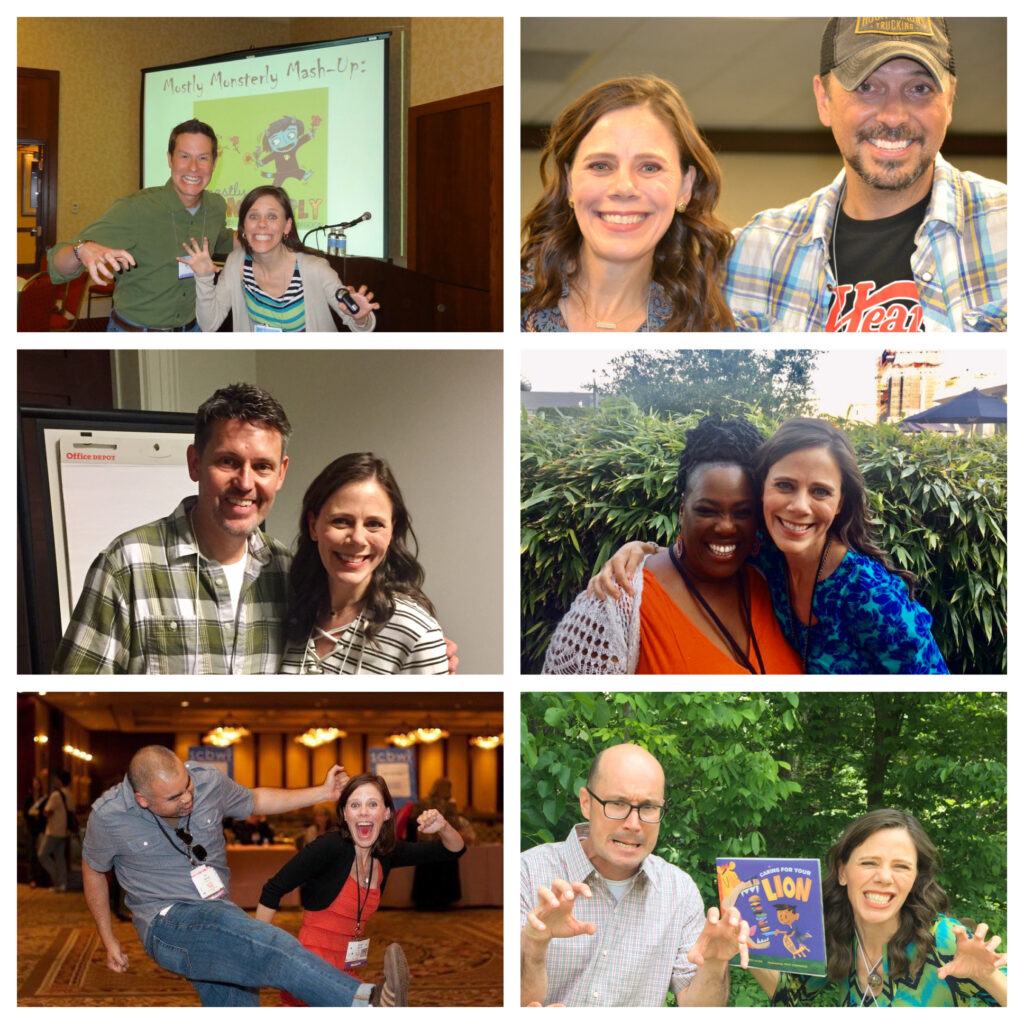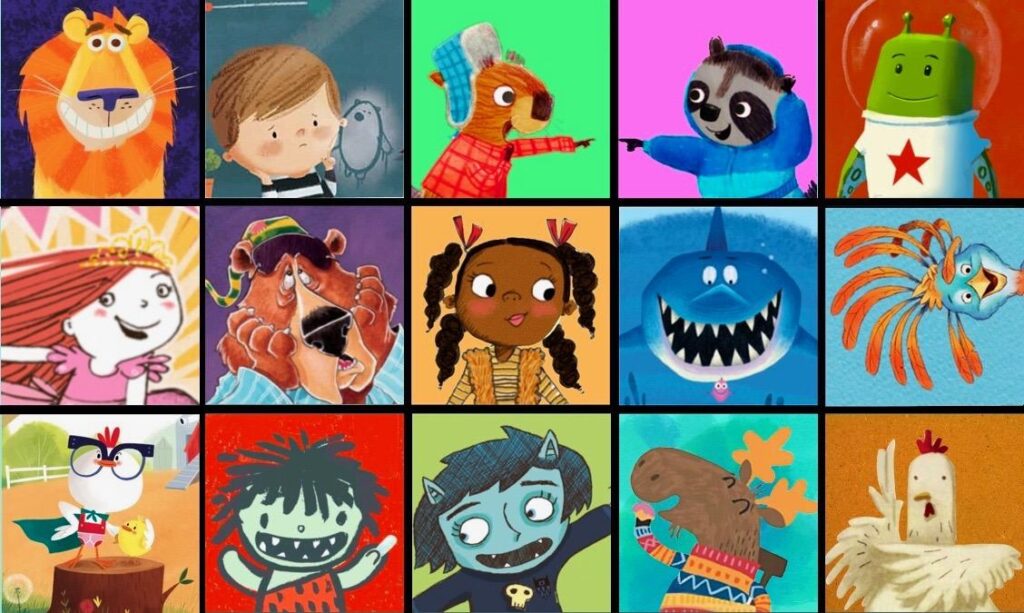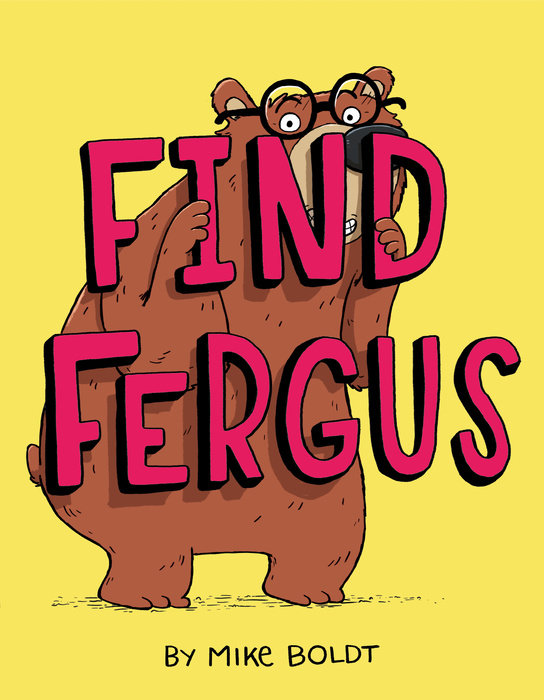I have been fortunate to have created books with many wonderful illustrators: Jeff Berger, Vanessa Brantley-Newton, Troy Cummings, Guy Frances, Alison Friend, Goro Fujita, Arthur Howard, Victoria Hutto, Dan Krall, Jeff Mack, Scott Magoon, Dave Mottram, Lynn Munsinger, Mike Reed, Angela Rozelaar, Dan Santat, Bob Shea, Michael Slack, Liz Starin, Dan Taylor, Jackie Urbanovic, and Zoe Waring.
Some of those illustrators are featured here:

Regular people (ones who are not writers and/or illustrators) often tell me that they simply can’t imagine writing a story and not being able to control what the art looks like. I remind these people that I am not an illustrator. I go on to say that publishing houses are filled with experts who try to make the best decisions for each book. I tell them that I almost always get to see the early sketches and early art for a book and am then invited to weigh in with my comments/suggestions. These people seem a bit relieved for me at this point. Then I have more news to break. I tell these people that the art director and editor will only include the comments/suggestions of mine that they view as valuable along with their own comments/suggestions for the illustrator.
And that’s okay! An illustrator isn’t going to call me up and say she really didn’t like the second line on the fourth page or that a particular word is really not one of his favorites.
I NEED illustrators. And I am so happy that I do. To me, it’s exciting to have a partner for a book and that I’m not just stuck on some raft in the middle of the publishing ocean by myself.
If, like me, you are a writer who is not an illustrator, I hope the following tips will prove helpful to you!
Writers should try very hard to do these things:
•not be a bossypants
•understand that the book belongs equally to the illustrator—never call the illustrator YOUR illustrator
•recognize that the storytelling should come from the art as much as from the text
•step back and let the illustrator bring his genius, sense of humor, and take on the world to the page
•realize that the experience should be an exciting, creative, and enjoyable one for the illustrator
•refrain from telling stuff in the text that can be shown in the art
•trust that the illustrator will probably come up with way better stuff than what you pictured in your head
•only include illustration notes when they convey necessary information that’s not readily apparent in the text
•frame illustration notes as suggestions—mine often begin with “perhaps ” (Refer back to not being a bossypants.)
Oh. And if it weren’t for the illustrators I have worked with, I would have never be able to imagine a Zoom situation quite like this:

Happy writing and/or illustrating, everyone!
WINNER:

Congratulations, Tina Cho! You are the winner of a signed copy of Mike Boldt’s Find Fergus.

Sometimes people ask me if the illustrations turned out the way I wanted. “NO,” I answer. “They’re 100 times better than anything I could have imagined.” Then I show them the words on one particular page, accompanied by the art that is TOTALLY not mentioned. “See? Patrice Barton is brilliant.” They see the power of 2 separate visions.
Yup! 🙂
Bossypants! Sounds like you might be talking about me! LOL. Great tips, Tammi. Love them. All true. I wish I were an illustrator AND a writer, but alas. Stick figures and art that kindergartners are impressed with. That’s it. Thanks for the tips.
P.S. I want to go to that Zoom!
Congrats Tina!
Glad you like the tips!
Thanks for the great tips Tammi.
You’re welcome! 🙂
That would be the best zoom ever!! Love it! Thanks for sharing the tips!
Ha! Agreed! I love how you can tell so much about each character’s personality by imagining them in a Zoom meeting.
Maybe a Zoom meeting will be your next story!
Great advice for all of us to be aware of our inner “bossypants”. 🙂
Ha! Being aware is the first step!
Great tips and great illustrators! And oh how I love that Zoom meeting!
Thanks, Michelle!
Great advice!
I am not an illustrator, and still in the ‘hopeful’ stage for a book, but the one thing I’ve always known is that it takes a team to create a picture book. I think of my job kind of like a scriptwriter – the illustrator, editors, and art director will bring my vision to life in full color, but only if I can give them something they love and the freedom to make it their own.
Oh! The reader, too! The reader brings a new layer to my story with their own imagination after the product is finally on the bookshelf. How I look forward to that day.
Thanks, Jen!
Excellent tips, Tammi! I’ll share this w/one of my critique groups. And I was surprised to see my name, even though you told me 😛
Thanks, Tina!
Wow such a fun group of collaborators! Between your text and their drawings, I feel like some of those characters are my friends and acquaintances. 😉
I’ll be checking my email in case Bernadette slipped me the link to that Zoom meeting…
Hahaha!
Great tips, Tammi. I’m always amazed at authors who don’t give credit to the illustrators who were also part of the success story! I love the zoom meeting!
Thanks, Judy!
Thank you so much! I will never forget these tips:)
You’re welcome, Sheri!
GREAT tips, Tammi! Seeing what the illustrator comes up with is half the fun!!
Agreed! 🙂
Excellent post Tammi! I especially id w/the commnet don’t say “my illustrator.”
Thanks, Kathy!
Thank you for these tips. It’s hard to let the story go, but so necessary to have the illustrator tell their story with incredible art!
You’re welcome, Charlotte!
I love Tammi’s books. Her advice is golden.
Thanks, Katherine!
Thanks for reminding us about the power of illustrations and just how much they add to picture books! I’m going back now to any illo notes and adding “perhaps”. I do not want to be a bossypants!
Hahaha!
Thanks, Tammi, for your wise advice. I agree 100%!
🙂
So many wonderful characters you + illustrators have created!
Thank you! 🙂
I am not an illustrator, but would love to have my children’s stories published. I see that many agents only want to see submissions that include the illustrations. I don’t want to give up! Any suggestions? Thanks!